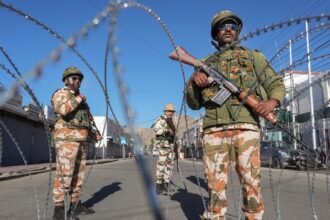“I can tell you that I was in the room when Vice President [JD] Vance spoke to Prime Minister Modi on the night of May 9,” Foreign Minister S Jaishankar said, denying US President Donald Trump’s claim that India agreed to a ceasefire with Pakistan under US trade pressure. “There was no linking of trade and ceasefire,” he added.
In a conversation with Newsweek in New York, Jaishankar gave a detailed account of the tense negotiations leading up to the ceasefire after India launched Operation Sindoor in retaliation for the April 22 terror attack in Pahalgam in Jammu and Kashmir. Calling the attack an “act of economic warfare,” he said it was designed to destroy Kashmir’s tourism industry and provoke communal tensions.
Jaishankar asserted that despite warnings from Washington about a “massive assault” by Pakistan, India stood firm and responded militarily, refusing to be swayed by nuclear threats or diplomatic pressure. “We did not accept certain things, and the Prime Minister was impervious to what the Pakistanis were threatening to do,” he said, adding, “On the contrary, he indicated that there would be a response from us.”
He shared his firsthand account of high-level talks during the crisis, stating that there was no link between trade negotiations and the ceasefire, at least from India’s perspective. “I can tell you that I was in the room when Vice President [JD] Vance spoke to Prime Minister Modi on the night of May 9,” Jaishankar said. “There was no linking of trade and ceasefire.”
The Minister added that Pakistan did launch a significant attack that night, but India responded swiftly. The next morning, Jaishankar spoke with US Secretary of State Marco Rubio, who conveyed that Pakistan was open to talks. By that afternoon, Pakistan’s DGMO, Major General Kashif Abdullah, called his Indian counterpart, Lt Gen Rajiv Ghai, requesting a ceasefire.
“So, I can only tell you from my personal experience what happened,” Jaishankar said during a chat with Newsweek CEO Dev Pragad.
Referring to the April 22 Pahalgam attack, in which civilians were asked to reveal their religion before being killed, Jaishankar said it aimed to “provoke religious violence” and destroy tourism in Kashmir, a key economic pillar. “We are now moving to a policy of no impunity. We will not accept that the terrorists are proxies and somehow, therefore, the state is not culpable. I mean, we think it’s very clear the Pakistani state is up to its eyeballs in this one,” he said.
Story continues below this ad
India responded by launching Operation Sindoor, targeting terrorist bases in Pakistan used by the Resistance Front, a group linked to Lashkar-e-Taiba.
Despite India’s denials, President Trump reiterated in a press conference last week, “I ended that with a series of phone calls on trade. I said, ‘Look, if you’re gonna go fighting each other … we’re not doing any trade deal.’” He added, “They responded that ‘You have to do a trade deal.’”
Jaishankar rejected this narrative. “Diplomacy and trade are not interlinked,” he said. “The trade people are doing what the trade people should be doing — negotiate with numbers and lines and products and do their trade-offs. They’re very professional and very focused.”








